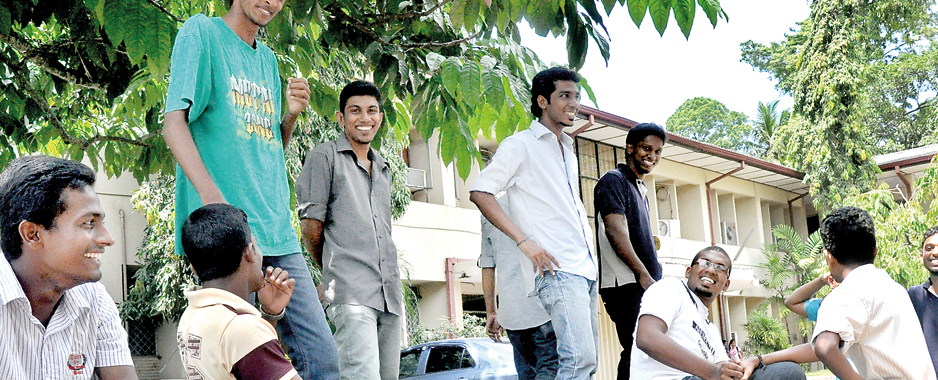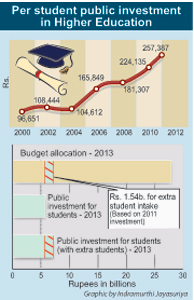FUTA action ends to be resumed if promises not kept
By Hansani Bandara, SundayTimes
The
100-day long trade union action by university academics fizzled out on
Friday amidst protests of section of the academics, but eventually
bringing relief to students and parents.�There was disappointment among
sections of the academics as they failed to gain clear commitments on
the demands of the Federation of the University Teachers Association
(FUTA).
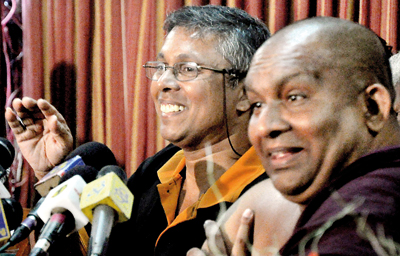 |
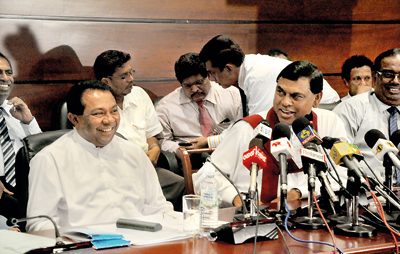
The two news conferences held yesterday: One convened by the Govt. and the other by FUTA. Pix by Mangala Weerasekera
|
University of Moratuwa FUTA branch President Dr. Rangika Halwathura
said that even though an agreement was made to halt the trade union
action, the majority of the membership is disappointed in the obdurate
stand of the Government on the demands.
“None of the universities frankly wanted to conclude their trade
union action but now we have come to the distressing realization that
nothing can be gained from this Government and since there is no point
on carrying out trade union action on a lost cause, we are concluding
it,” he said.
He that the majority at the executive committee meeting rejected the
two letters given by Minister Basil Rajapaksa and Treasury Secretary P.
B. Jayasundara regarding the solutions to the issues raised.
He said in one way FUTA has achieved victory as it has been able to
create a dialogue in the country on the issues of education where 6 per
cent of the GDP should be set apart for education became a common slogan
among the general public.
He further added that the struggle to save State education will
continue even though the trade union action was halted and the strike
will be resumed again if the given promises are not kept.
The trade union action which was carried out by FUTA came to a
conclusion of Friday as both FUTA and the Government came to a mutual
agreement on the former’s demands.
The strike continued for almost 100 days since it began on July 4
crippling the functioning of 14 State universities island-wide.
After the consideration of six demands of FUTA which were categorized
under enhancing recruitment and retention of highly qualified academics
and safeguarding and uplifting State education, FUTA has been issued
two letters with regards to salary increments and a promise to increase
the budgetary allocation for education.
These letters were issued by Dr. Jayasundara and Minister Basil
Rajapaksa respectively, said Dr. FUTA Secretary Terrance Madujith.
He added the academics were presented a proposal by which a medium
term salary scheme is to be implemented with effect from the 2013 Budget
through a period of five years. �He also said that in Minister Basil
Rajapaksa’s letter, it is mentioned that the budgetary allocation on
education will be increased but a time frame as to how it will be
implemented has not been given by the Government.
However the Sunday Times learns the majority of the sister unions in
FUTA believe these two letters are unacceptable but they are compelled
to suspend trade union action due to financial difficulties undergone by
the membership and inconveniences undergone by the students due to
disrupted academic activities.
Meanwhile, FUTA President Dr. Nirmal Ranjith Dewasiri said on the
plus side, the negotiations carried out prove that the struggle carried
out by FUTA to save State education and the FUTA demands are justified.
He added there are unfinished discussions among the membership within
FUTA on whether or not the documents issued by the Government are
acceptable or whether to reconsider trade union action.
He also said it is a victory for FUTA that the association has been
able to create a dialogue about these issues in society helping to bring
the attention of the relevant authorities to these issues.
Adding that university academics will participate in paper marking of
the Advanced Level examination scripts commencing from tomorrow, he
said university dons will work hard to revive the university system.
Minister Basil Rajapaksa said the responsibility for the disruption
caused by this issue to the proper functioning of the university has to
be borne by all the stakeholders to the issue. He added the Government
has agreed to increase the percentage of GDP allocation for education
and pay the salary arrears to the academics.
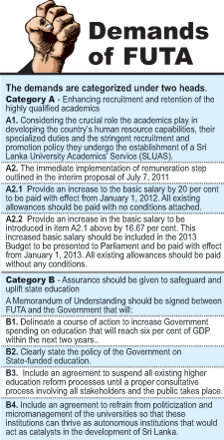 |
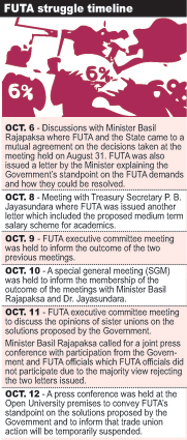 |
